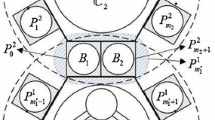Abstract
In this paper, we present an improved one-step lookahead A* algorithm for the scheduling problem for parallel-mode cluster tools, where n wafer types are simultaneously processed on a cluster tool with m chambers. Specifically, we suggest a refined cost function, priority-based node selection, N-chamber cycle detection to identify deadlock situations, and a one-step lookahead method to reduce the number of unsafe states generated. Using numerical experiments, we show that the proposed algorithm leads to a significant reduction in the number of explored states and execution time necessary to find an optimal solution.
Similar content being viewed by others
References
Dümmler M (2004) Modeling and optimization of cluster tools in semiconductor manufacturing. PhD thesis, University of Würzburg, Germany
Mönch L, Fowler JW, Dauzère-Pérès S, Mason SJ, Rose O (2010) A survey of problems, solution techniques, and future challenges in scheduling semiconductor manufacturing operations. J Sched 14:1–17
Agrawal GK, Heragu SS (2006) A survey of automated material handling systems in 300-mm SemiconductorFabs. IEEE Trans Semicond Manuf 19(1):112–120
Lee TE (2008) A review of scheduling theory and methods for semiconductor manufacturing cluster tools. In Proceedings of the 2008 winter simulation conference, pp. 2127–2135
Unbehaun R, Rose O (2006) The use of slow down factors for the analysis and development of scheduling algorithms for parallel cluster tools. In Proceedings of the 2006 winter simulation conference, pp. 1840–1847
Niedermayer H, Rose O (2004a) A simulation-based analysis of the cycle time of cluster tools in semiconductor manufacturing. In Proceedings of the annual IIE industrial engineering research conference, Houston, Texas
Niedermayer H, Rose O (2004b) Approximation of the cycle time of cluster tools in semiconductor manufacturing. In Proceedings of the industrial engineering research conference
Unbehaun R, Rose O (2007) Predicting cluster tool behavior with slow down factors. In Proceedings of the 2007 winter simulation conference, pp. 1755–1760
LeBaron T, Domasche J (2005) Optimizing robot algorithms with simulation. In Proceedings of the 2005 winter simulation conference, pp. 2211–2217
Gupta AK, Sivakumar AI (2006) Job shop scheduling techniques in semiconductor manufacturing. Int J Adv Manuf Technol 27(11–12):1163–1169
Cheng H-C, Chiang T-C, Fu L-C (2011) A two-stage hybrid memetic algorithm for multiobjective job shop scheduling. Expert Syst Appl 38(9):10983–10998
He YL, Wang GN (2006) Petri nets based deadlock-free scheduling for flexible manufacturing systems. In Proceedings of the control, automation, robotics and vision conference, pp. 1–5
Kim HH, Choi JY (2009) Development of an improved A* algorithm for capacitated FMS with considerable scale. In Proceedings of the international conference on intelligent manufacturing logistics systems
Murata T (1989) Petri nets: properties, analysis, and applications. Proc IEEE 77(4):541–580
Coffman EG, Elphick MJ, Shoshani A (1971) System deadlocks. ACM Comput Surv 3(2):67–78
Huang B, Sun Y, Sun YM (2008) Scheduling of flexible manufacturing systems based on Petri nets and hybrid heuristic search. Int J Prod Res 46(16):553–4565
Moser M, Engell S (1992) A survey of priority rules for FMS scheduling and their performance for the benchmark problem. In Proceedings of the 31st IEEE international conference on decision and control, pp. 392–397
Pierreval H (1992) Expert system for selecting priority rules in flexible manufacturing systems. Expert Syst Appl 5(1–2):51–57
Author information
Authors and Affiliations
Corresponding author
Rights and permissions
About this article
Cite this article
Kim, H.H., Choi, J.Y. An efficient one-step lookahead A* algorithm for PM-CT scheduling problems. Int J Adv Manuf Technol 72, 1481–1489 (2014). https://doi.org/10.1007/s00170-014-5755-1
Received:
Accepted:
Published:
Issue Date:
DOI: https://doi.org/10.1007/s00170-014-5755-1




